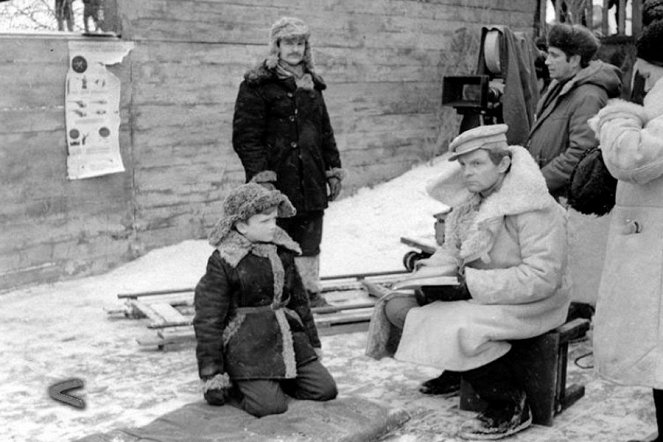Regie:
Andrei TarkowskiKamera:
Vadim YusovMusik:
Vyacheslav OvchinnikovBesetzung:
Nikolay Burlyaev, Valentin Zubkov, Evgeniy Zharikov, Stěpan Krylov, Nikolay Grinko, Valentina Malyavina, Irma Raush, Dmitri Milyutenko (mehr)Inhalte(1)
Regisseur Andrej Tarkowskijs erschütterndes Erstlingswerk von 1962 beschreibt in Rückblenden die Geschichte einer kurzen und vom Krieg zerstörten Kindheit. Im Mittelpunkt steht der 12-jährige Iwan Bondarow. Sein Vater fiel bereits zu Beginn des 2. Weltkrieges als Grenzsoldat, seine Mutter und seine kleine Schwester wurden umgebracht. Iwan selbst konnte nur mit viel Glück aus dem deutschen Todeslager fliehen. Seitdem verfolgen ihn Träume, die mit schönen "Kindheits"-Erinnerungen beginnen und in schreckliche Alpträume münden. Realistische Kriegsszenen, Wach-, Alp- und Wunschträume des Jungen verschmelzen mit Dokumentaraufnahmen zu einer Einheit. Der Antikriegsfilm erhält bei den Internationalen Filmfestspielen von Venedig 1962 den "Goldenen Löwen", im gleichen Jahr auf dem Festival in San Francisco den "Golden Gate Award" für die beste Regie sowie auf dem Festival der Festivalfilme in Acapulco, Mexiko, den "Großen Preis". (Verleiher-Text)
(mehr)Kritiken (3)
Beautifully made borefest. The visuals are gorgeous, with an enchanting and captivating atmosphere, but the story is uninteresting and quite incoherent. Sure, Takrovsky has never told complex closed stories, but he usually didn’t have trouble working with the curiosity of the viewer and leading the attention of the audience, but in his debut he only works visually, stumbling into boring detours. And I had faith in it. 60%
()
This festival award-winning war film is a bit of a mystery to me. At one point it seems that Tarkovsky wants to tell the story of a boy whose childhood is heavily marked by the war, and then suddenly a chapter comes along that doesn't move the plot anywhere, is not related to the previous minutes at all, where Tarkovsky plays a love game between a young officer and a nurse. It doesn't hold together very well, but on the other hand it has to be admitted that it is a diametrically different point of view on the Great Patriotic War, which at that time was the subject of hurrah-films full of the heaving chests of horny Soviet soldiers. Tarkovsky's courage deserves praise, as does his feeling for the image, which he has demonstrated in this work.
()
In his feature debut, Tarkovsky already showed what his strongest aspects were - camera work, the ability to create magical images, a lyrical atmosphere, and sensitive selection and work with actors. While his film lacks the famous ideological fervor and heroism typical of Soviet war movies, it is, nonetheless, much more civil and focuses not on ideology but rather on patriotism. This early piece by Tarkovsky is probably the most sympathetic to me (although far from the best) for one simple reason. Here, he still holds back and manages with a very reasonable runtime. The long shots are thus not tiring or burdensome. Tarkovsky's work can be seen as the absolute opposite of today's music video production, which relies on wild editing and camera movements. In Tarkovsky's work, the image itself and its composition are important. Overall impression: 65%.
()
Galerie (57)
Photo © RUSCICO


Werbung